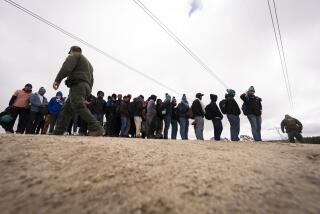A broader definition of rape
- Share via
When the FBI reports statistics on rape in its annual crime report, it includes only incidents that involve “carnal knowledge of a female, forcibly and against her will.” But that’s too narrow a definition. Most local and state police jurisdictions these days use much broader language.
In fact, the FBI definition, which is more than 80 years old, is so outdated that many of the cases that local law enforcement authorities categorize as rape never get listed in the FBI’s annual Uniform Crime Reports.
But that will soon change. The FBI’s Criminal Justice Advisory Policy Board voted this month to recommend broadening significantly the definition of rape. FBI Director Robert Mueller signaled his approval, telling the Senate Judiciary Committee last week that the old definition was unworkable and a broader one would be in place probably by next spring.
The language the advisory board crafted defines rape as a crime against a woman or man that involves any vaginal or anal penetration by any object or body part. It also includes oral sexual penetration as a rape act. It drops the word “forcibly,” and states that these acts are a crime if they occur without consent.
This overdue change is not just symbolic. Academics, legislators and public officials rely on the statistics when crafting laws and setting policy. What’s more, understating rape’s occurrence, women’s advocates say, not only misleads the public about the prevalence of the crime, but also hinders funding for enforcement and treatment programs.
“From a citizen’s point of view, you can’t monitor something if you can’t measure it,” said Carol Tracy, executive director of the Women’s Law Project, who began lobbying the FBI to make the change 10 years ago.
We commend Mueller for taking action finally.
In the FBI’s defense, it already has a National Incident-Based Reporting System (NIBRS) that recognizes a broader description of rape. But the system requires such labor-intensive data gathering that many states do not participate. (California does not.) The data from this system currently covers only about 28% of the population.
A new definition also would trigger a change in public reporting by those local law enforcement agencies that have not modernized their own descriptions of rape.
The Los Angeles Police Department lists as rape only those assaults that fit the FBI’s current narrow definition. Other assaults like sodomy or forced oral copulation fall, statistically, into other lesser crime categories — although they are investigated with as much perseverance as a rape case, according to L.A. officials.
But it will be important to have statistical accounting change at the city level as much as at the federal level. As women’s advocates have said — rape is rape.
More to Read
A cure for the common opinion
Get thought-provoking perspectives with our weekly newsletter.
You may occasionally receive promotional content from the Los Angeles Times.






